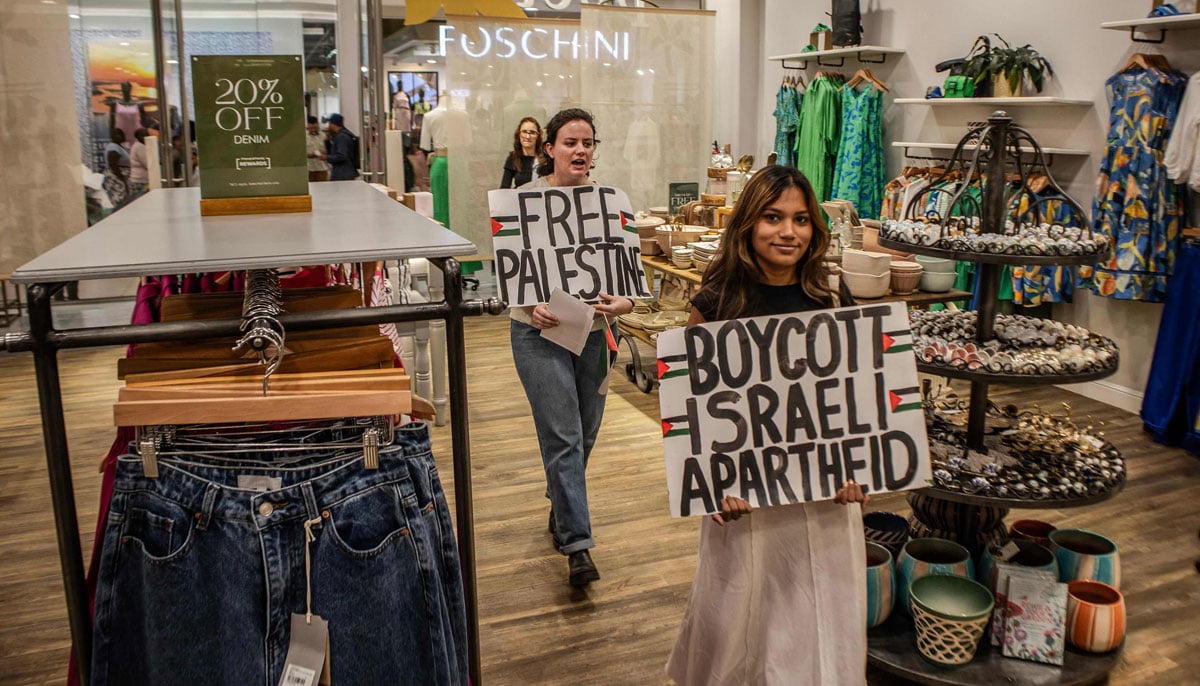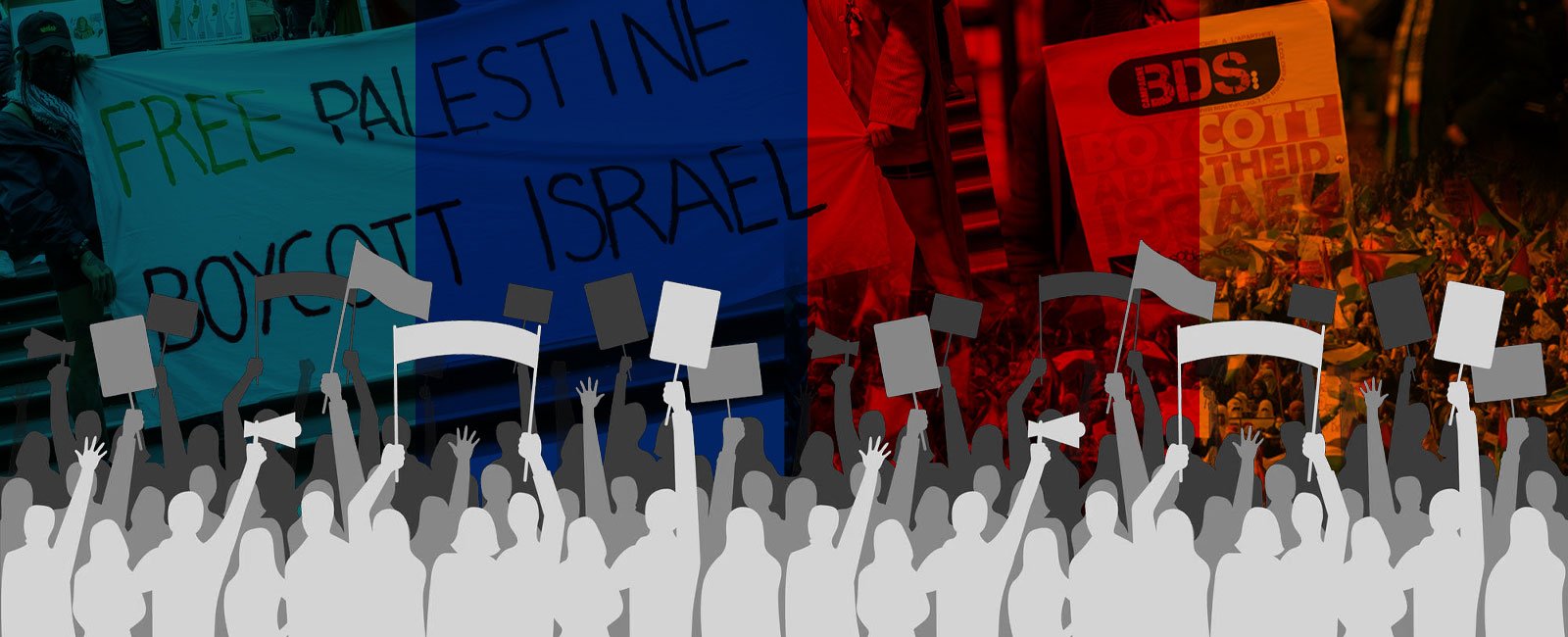Should Pakistanis boycott American, Israeli products?
Amid mass protests against Israeli war crimes in Gaza, drives to boycott US and Israeli products are also gaining traction in many countries including Pakistan

Uswah Zahid, 25, has decided to never buy anything from foreign brands that have an association with Israel or the US no matter how many discounts they offer or how little of an impact it creates on their economy.
Zahid has been boycotting Western food outlets for a month now. Other than that, she is also avoiding buying skincare, makeup and other products that majorly contribute to Israel's genocide to “play no role” in the ethnic cleansing of Palestinians and the killing of innocent lives.
Following Israel's latest attack on Gaza, which has already suffered immensely due to decades of violence and oppression, a powerful and somewhat controversial tool has emerged — the boycott. It aims to cripple Israeli-owned and other companies that support Israel, and thus, force an end to the attack.
While hundreds of thousands across the world protest Israel's actions in Gaza, boycott movements continue to gain momentum in different countries, including in Pakistan.
From the origins of the boycott movement to the challenges it poses, Geo.tv explores the voices of various stakeholders, seeking to answer pressing questions: Can boycotts be an effective catalyst for change, or do they harm Pakistan’s economy? What are the potential consequences for the people caught in the crossfire?
What is BDS?
While people have been boycotting on an individual level, the most organised and widespread example of such a campaign is the Boycott, Divestment, Sanctions (BDS) movement started by 170 Palestinian organisations in 2005.
The movement was inspired by a similar one against apartheid in South Africa and calls for actions to pressure Israel into complying with international law.
These actions include boycotting the Israeli government, complicit sporting, cultural and academic institutions and Israeli and international companies supporting violence against Palestinians; withdrawing investments from Israel and all companies supporting the violence; and pressuring governments to end trade agreements and impose sanctions on Israel so it is forced to comply with international laws. The movement’s website features a list of companies that it urges people to boycott.
The BDS movement lists three demands for Israel on its website — end occupation and colonisation of all Arab lands, including Gaza, East Jerusalem and the Syrian Golan Heights, and dismantle the Apartheid wall — over 700 kilometres wall that stretches along part of the occupied West Bank; recognise the fundamental rights of the Arab-Palestinian citizens of Israel to full equality; and protect and promote the rights of Palestinian refugees to return to their homes and properties per the United Nations resolution.
Boycott movement in Pakistan
Pakistan is already one of the 27 countries that never had diplomatic relations with Israel. It also does not recognise Israeli statehood. Following the events of October 7, calls to boycott products of specific companies considered to be supporting Israel started emerging on social media.
One post, in particular, about McDonald’s was widely circulated. The company’s franchises in Israel announced free meals for soldiers. This elicited widespread condemnation on social media and franchises in other countries quickly distanced themselves, and even announced donations to organisations supporting Palestinians.
McDonald’s Pakistan released a statement announcing a donation of Rs10 million through the Edhi Foundation. It also stated that it was a “wholly Pakistani entity owned and managed by SIZA Foods (Pvt) Ltd” and rejected “any claims questioning our Pakistani identity”. The statement also said the company’s devotion was reflected in its contribution to Pakistan’s economy, job creation and fostering of local businesses.
McDonald’s Pakistan later also shared a detailed statement, addressing questions about its ownership and stance on the matter.
It was also claimed on social media that Imtiaz Super Stores — known as Pakistan’s Walmart — has removed certain foreign brands from its shelves. However, a visit to a couple of the stores showed that nothing had been removed.
We also spoke to the people working there who confirmed that none of the products were ever removed.
They also told us that the sales of locally made products had moved up in the past few weeks.
A source in the supermarket's managerial staff also confirmed that none of the products were removed as the superstore has contracts with certain brands, and voiding these could damage them financially.
Following the best investigative journalism practices, Geo.tv duly reached out to Imtiaz Supermarket management for a response regarding its findings but received none till the filing of this report.
Speaking to Geo.tv, on the condition of anonymity, a salesman at another major supermarket said people were strictly avoiding US and Israeli products.
“Nowadays customers even ask us to suggest alternatives to these products,” he said, adding that the management was also concerned about the stock as containers had been bought on credit.
Geo.tv reached out to KFC, PepsiCo, Nestle, and Coca Cola but they too refused to respond.
‘Matter of religious consciousness’
Commenting on the boycott, Jamaat-e-Islami (JI) spokesperson Asad Qaiser said that the US was supporting Israel in all ways, which meant it was also responsible for the plight of Palestinians. On the other hand, the Muslim world had not shown a strong front, and even the Organisation of Islamic Cooperation (OIC) did not adopt a strong stance.
“In light of this context, and the Pakistani government also not taking a strong [stance], this step of hurting them [Israel and the US] financially is a drop in the ocean.
"The Muslim ummah should join this movement as a whole to show that it stands in solidarity with Gaza and its people. We aren't using these commodities because the profits are being used to buy weapons for attacking Palestinians,” he commented.
JI is among the few political parties that have been supporting the boycott openly, urging their party supporters to join the movement.
When asked whether this would increase unemployment in the country, Qaiser said it was a matter of “religious consciousness”.
“I think this is a small issue. People can find other jobs. Also, it is a person's democratic right to boycott the products that they want — and people should join this boycott,” the JI spokesperson added.
The boycott in Pakistan is not necessarily happening in an echo chamber, as not just religiously motivated individuals and groups, but even personalities in the country's mainstream media are pushing people to buy local and shun imported products and franchises that have links to Israel.
Actors Ushna Shah, Dananeer Mobeen, Yasir Hussain, Hassan Raheem, Armeena Rana Khan and Osman Khalid Butt are among the many vocal voices on the Pakistani internet, boycotting brands directly contributing to the Israeli economy.
Will it affect Pakistan’s economy?
In a bid to get an answer to this query and know if these boycotts affect the parent companies, Geo.tv reached out to independent macroeconomist Ammar Habib Khan, who in his reply said "not a lot". According to Khan, similar boycotts have been done in the past but things returned to normal shortly afterwards.
On whether this would harm local companies holding franchise rights in the long run, Khan said “not necessarily” since boycotts had been happening in different countries at different times and are already accounted for in any regional expansion strategy.
However, the boycott would hit sales for now. “Any firm operating in Pakistan is already generating jobs, taxes, and economic activity locally. Any boycott inadvertently hurts that economic activity as well,” the economist commented.
According to him, the boycott “may not have a major impact” on the overall economy as any damage would remain limited to the fringes and would quickly revert to normal as things settled.
Meanwhile, Director Arif Habib Group Ahsan Mehanti lamented that multinational companies have been impacted owing to ongoing protests and boycotts.
“Executives and workers are dependent on MNCs working in Pakistan employing more than a million and jobs are now at stake,” he claimed.
Mehanti added the loss to MNCs was both explicit in corporate financials that weakened the sales by up to 75% in selected substitutable lines in the food business and implicit in employee morale owing to religious bonds.
He suggested that the government could handle the possible loss of jobs and financials with tax incentives to affected MNCs.
“While MNCs can run customer awareness and incentive campaigns to help them come out of public resentment,” he added.
‘Pakistani campaign will not play well with govt’
Meanwhile, Michael Kugelman, director of the South Asia Institute at the Wilson Centre think tank, said: "The boycott issue gets at a broader conundrum that emerges when campaigns built around moral causes bump up against inconvenient economic truths".
"For instance, many Western countries wanted to decouple from China’s economy."
“But because so much of the world is dependent on China’s economy, decoupling from China is almost impossible.
"Likewise, while many in Pakistan and beyond, want to boycott US because of US support for Israel, that’s tough to do because so much of the world is reliant on US companies and economic assistance.”
According to Kugleman, US companies invest in Pakistan and the US is also the country’s top export destination.
“Pakistani public campaigns to boycott US products will play well with the common people, but not with a government trying to emerge from a terrible economic crisis and not wanting to do anything that could worsen Pakistan’s economic plight,” Kugelman commented.
‘US is not threatened by any BDS campaign’
The consequences of this boycott are not limited to the business realm; they extend into the political arena, posing challenges to the delicate balance of international relations. As both nations navigate this uncharted territory, the efficacy of such grassroots movements in influencing diplomatic decisions is becoming increasingly evident.
Geo.tv spoke to the former ambassador to the US, India and China and the head of UN missions in Iraq and Sudan, Ashraf Jehangir Qazi, to delve into the details of the possible repercussions of the boycott.
Qazi said that there was of course the well-known BDS campaign in the US, calling for a "boycott, divestment and sanctions" regime against Israel.
Many hugely respected pro-Palestinian US commentators such as Noam Chomsky and Norman Finkelstein have opposed this campaign as being self-defeating which will neither help the Palestinian cause nor harm Israel's military might which is guaranteed by the US.

“Accordingly, BDS can only help if there is a complete shift in US policy towards Israel of which the current prospect is near zero. Accordingly, a boycott of Israeli goods is irrelevant for Pakistan and would be no more than a self-satisfying gesture, carrying a symbolic value."
“Nevertheless, even as a more or less empty gesture it would be appreciated by the Palestinians — and so I would support it,” he emphasised.
Commenting on the impact on the Pak-US relationship, Qazi said Pakistan's ruling elites were dependent on the goodwill of the US for their survival and economic prosperity at the expense of the people of Pakistan.
“Without US support — and the International Monetary Fund (IMF) is little more than a branch office of the US Treasury — the Pakistan economy in its current state would collapse in no time. All our so-called economic reforms are premised on US support. Of course, if the larger and more powerful economies of the world were to threaten a US boycott the situation would change. But China is not looking for confrontation with the US, Europe is economically and strategically a satellite of the US, India, Japan, Australia, etc are also in the US orbit, etc.”
“So, for the time being, the US is not threatened by any BDS campaign,” he maintained.
To sum it up, the impracticality of boycotting Israeli and US products is tangled up in the complex web of global economics and geopolitics. Instead of betting only on consumer choices, a positive change warrants educated dialogue, diplomacy, and reconciliation at an international level. Initiatives like building bridges and nurturing understanding may be way more effective than panoptic boycotts in dealing with what's under the hood.
Afreen Mirza is a staffer at Geo.tv. She posts @afreenmirza97
— Header and thumbnail illustration by Geo.tv




